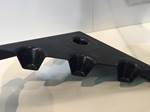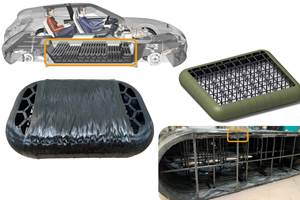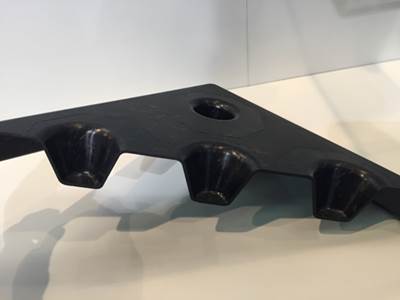Teijin Ltd. to acquire Continental Structural Plastics
Teijin, as part of its efforts to become a Tier 1 automotive composites supplier, pays US$825 million for automotive composites specialist Continental Structural Plastics.
Share
Teijin Ltd. (Tokyo, Japan) announced on Sept. 13 that it has agreed to acquire Continental Structural Plastics (Auburn Hills, Michigan), a leading automotive composite supplier in North America, for US$825 million. CSP will become a wholly owned subsidiary of Teijin. Through this acquisition, Teijin intends to establish the foundations of an automotive composite products business in North America, and to accelerate its expansion as a Tier 1 supplier of high-performance composites to the global automotive market.
The shares of CSP will be purchased by Teijin Holdings USA Inc., the Teijin Group's holding company in the US. The acquisition is scheduled to be completed in December 2016 after satisfaction of customary closing conditions, including regulatory approval.
CSP is a leading manufacturer of thermoset composites in the automotive industry and is the world’s largest sheet molding compound (SMC) manufacturer for automakers. Since its establishment in 1969, CSP has provided leading-edge technologies in lightweight materials and composite solutions such as glass fiber reinforced plastic (GFRP) for the automotive industry. CSP provides full-service engineering support, and holds more than 50 patents covering materials development and manufacturing processes in composite materials formulation and design. Its Class A surfaces produced by its SMC technology have been adopted by various automakers in the US, Europe and Japan. The company has 14 facilities in the US, Mexico, France and China and approximately 3,200 employees. It posted consolidated sales of more than US$634 million in the fiscal year ending Dec. 31, 2015.
Teijin says it will benefit from CSP’s established sales channels in the North American automotive market, which will enable the combined business to provide a broader range of solutions that meet automakers’ demands for weight reduction and durability, utilizing the company’s thermoplastic composite technologies.
Teijin says the integration of CSP’s technical expertise in thermoset composites and Teijin’s leadership in complementary thermoplastics creates significant synergies for comprehensive multi-material applications to meet diversified demands from the automotive industry. Through this transaction, Teijin aims to become an automotive solution provider by expanding its offerings beyond carbon fiber and glass fiber materials, in collaboration with other materials manufacturers. Teijin intends to expand its product portfolio from materials to component design, implement a global supply chain and help achieve vehicle weight reductions in order to comply with tighter environmental regulations being introduced after 2020.
Teijin says it believes the combination of CSP’s thermoset capabilities, especially its GFRP technology, and Teijin’s high-performance composites such as carbon fiber reinforced thermoplastic (CFRTP), will help reduce weight and component count in finished products. This will in turn improve recycling efficiency and offer automakers value-added solutions that meet their requirements for more environmentally friendly components at lower cost. Teijin will also use CSP’s European Center for Advanced Technology in France and Teijin’s own composite production facilities to enhance its global development capabilities, allowing the combined business to better address the requirements of European, Japanese and Asian automakers. The automotive composite products business of the Teijin Group is targeting annual sales of US$2.0 billion by 2030.
Jun Suzuki, president and CEO of Teijin Ltd., says: “Since being appointed as Teijin’s president in January 2014, I have pursued business models that help provide value-added solutions by combining and integrating our own materials, healthcare and IT technologies. We are confident that the platform for automotive composite products business we will gain through the acquisition of CSP’s complementary technical expertise in thermoset composites and GFRP know-how will trigger further development of our integrated high-performance materials business, one of our key strategic fields.”
Suzuki adds: “Utilizing such synergy effects, and as outlined in our 2014 Transformation and Growth Strategies in Revised Medium-Term Management Plan, Teijin aims to provide consistent upstream-to-downstream solutions and realize one of the company’s growth concepts, which is high-performance materials technologies that create new value. The Teijin Group will continue to evolve, aiming to become a company that supports future society leveraging our core strengths in integrated high-performance materials and healthcare.”
Teijin established its Teijin Composites Innovation Center in 2008 and has focused on developing leading-edge composite product technologies and applications. In 2011 the company developed the world’s first mass-production technology for CFRTP, with a production interval time - or “takt-time” - of 1 minute. Teijin subsequently established a technical facility in the US and a pilot plant for the fully integrated production of CFRTP in Japan. In 2012 it branded the world’s first CFRTP product — Sereebo — and has been preparing this for commercial use via high-volume production methods in collaboration with domestic and international enterprises. Meanwhile, Toho Tenax Co. Ltd., the core company of the group’s carbon fibers and composites business, has developed an integrated production system for carbon fiber-reinforced plastic (CFRP) using its Tenax Part via Preform (PvP) technology that reduces carbon fiber waste compared to conventional preform production methods.
Related Content
TU Munich develops cuboidal conformable tanks using carbon fiber composites for increased hydrogen storage
Flat tank enabling standard platform for BEV and FCEV uses thermoplastic and thermoset composites, overwrapped skeleton design in pursuit of 25% more H2 storage.
Read MoreJeep all-composite roof receivers achieve steel performance at low mass
Ultrashort carbon fiber/PPA replaces steel on rooftop brackets to hold Jeep soft tops, hardtops.
Read MoreCarbon fiber, bionic design achieve peak performance in race-ready production vehicle
Porsche worked with Action Composites to design and manufacture an innovative carbon fiber safety cage option to lightweight one of its series race vehicles, built in a one-shot compression molding process.
Read MoreMcLaren celebrates 10 years of the McLaren P1 hybrid hypercar
Lightweight carbon fiber construction, Formula 1-inspired aerodynamics and high-performance hybrid powertrain technologies hallmark this hybrid vehicle, serve as a springboard for new race cars.
Read MoreRead Next
Teijin sheds more light on Sereebo manufacturing process
Combining a chopped carbon fiber mat with nylon 6 resin, the process will be used to fabricate primary automotive structures in a forthcoming production vehicle.
Read MorePlant tour: Daher Shap’in TechCenter and composites production plant, Saint-Aignan-de-Grandlieu, France
Co-located R&D and production advance OOA thermosets, thermoplastics, welding, recycling and digital technologies for faster processing and certification of lighter, more sustainable composites.
Read MoreAll-recycled, needle-punched nonwoven CFRP slashes carbon footprint of Formula 2 seat
Dallara and Tenowo collaborate to produce a race-ready Formula 2 seat using recycled carbon fiber, reducing CO2 emissions by 97.5% compared to virgin materials.
Read More

























